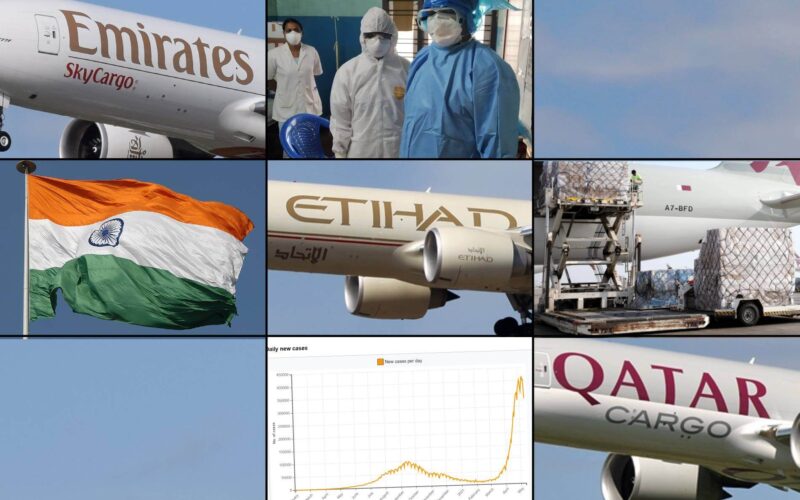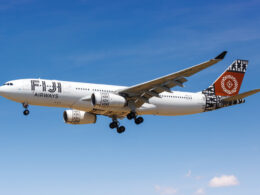For several weeks now, India has been suffering from the largest public health crisis in its history. India’s third wave of COVID-19 infections is widely considered to be the worst in the world, with hundreds of thousands of new cases reported every day.
The country’s health system is overstrained, resulting in people being unable to get the much-needed help. All over the world, various countries, organizations, and companies scramble to provide humanitarian help to the suffering country.
Airlines play a crucial part in that, transporting badly needed supplies to Indian airports – a smaller-scale repetition of a situation the world already experienced in the first months of the pandemic, in early 2020.
Among all the airlines taking part in the relief effort, three were particularly active.
Emirates, Etihad Airways, and Qatar Airways, the so-called Big Three of the Middle East, have always considered India as a particularly important market.
Their focus on long-haul, hub-to-hub travel, and an advantageous position of being a gateway between India and the Western countries, have Indian travelers and Middle Eastern airlines mutually dependent on one another.
In fact, according to Statista, in 2019, Emirates, Etihad Airways, and Qatar Airways occupied the third, fifth, and ninth places in India by the market share of international traffic, altogether taking up almost 20% of the market.
It is only natural that all three companies took particular interest in the latest relief effort, showcasing their commitment to India and investing heavily into the efforts to mitigate the crisis.
Their actions can be seen as both an attempt to improve their image and a genuine struggle to help India recover. After all, much of their ability to fly people to and from the country – and generate revenue this way – depends on the ending of the pandemic. The worse the situation gets, and the longer it stays that way, the longer a valuable market remains cut off.
So, what exact actions did the airlines take?
Etihad Airways: promising transportation
Etihad Airways is a member of the HOPE Consortium – a collective initiated by United Arab Emirates (UAE) capital Abu Dhabi and intended to facilitate and improve the distribution of COVID-19 vaccines.
The airline itself did not announce an independent initiative regarding the Indian crisis, but the consortium did. As a part of it, in addition to vaccine distribution efforts in India, Etihad Cargo is aiming to deliver other supplies needed by India’s hospitals.
On April 27, Etihad announced that it was going to expand the usual repertoire of pandemic relief and start transporting ventilators, PPEs and other medical devices to India. The exact plan and start date of those operations was not announced.
In comparison with the efforts of other two airlines, Etihad’s contribution might seem rather small. But for a while now the company has been strongly leaning towards increasing the scale of vaccine transportation – a strategy that already strained its cargo capacity. On top of that, the company has not been experiencing its strongest period as its financials were hit particularly hard by the pandemic, adding to its long-running troubles.
Read more: Etihad Airways’ struggles: Has ME3 turned into ME2? | Data
Qatar Airways: shipping donations for free
On April 29, Qatar Airways announced the plan of their Indian relief initiative: the airline would ship 300 metric tons of international aid free of charge.
The promise was upheld on May 3, when three Qatari airplanes took off from Doha loaded with PPEs, ventilators, oxygen supplies, and other medical devices donated by various non-governmental organizations (NGOs).
They were headed for Bengaluru, Mumbai, and New Delhi, in order for supplies to be distributed in India’s worst hit regions.
Dubbed WeQare initiative, the relief convoy consisted of three Boeing 777 freighters each being able to carry 102 tons of cargo – if the aircraft were indeed loaded to the brim.
In an interview to the BBC, Qatar Airways CEO Akbar Al Baker said that the airline was preparing for another, even bigger shipment of COVID-19 aid from the British government to India. According to Al Baker, Qatar Airways was determined to carry any donated aid to India free of charge, meaning that the airline’s involvement in the relief effort may go far beyond the initial plans.
Emirates: emergency air bridge
Taking a page of Qatar’s book, Emirates launched their own initiative to ship humanitarian aid to India free of charge. Their effort was a bit different though: Emirates launched an air bridge on “as available” basis.
It means that any medical supplies and relief items, donated by NGOs, are to be transported on Emirates’ scheduled and charter flights free of charge if the capacity is available. More convenient than organizing separate special flights, the scheme, nonetheless, has a potential to provide a possibility to transfer a huge amount of cargo.
The initiative was launched on May 9, and connects the so-called Dubai International Humanitarian City – a massive logistics facility, which the company claims to be the largest in the world – with nine Indian cities.
Among them are Kochi, Kolkata, Mumbai, and other cities that have found themselves in the thick of the crisis. The air bridge was launched with an immediate effect, so, we can presume that relief-loaded planes were already waiting to take off.
According to the data from Radarbox, the airline performs one or two daily cargo flights to most of the air bridge destinations. It is difficult to quantify the amount of relief transported that way, but assuming the rather low load factor usually associated with scheduled cargo operations – according to the company’s financial report, through the 2020 it hovered around 65% – there is a chance that each of airline’s Boeing 777s could transport dozens of tons of humanitarian aid in the space that would usually be left empty.









